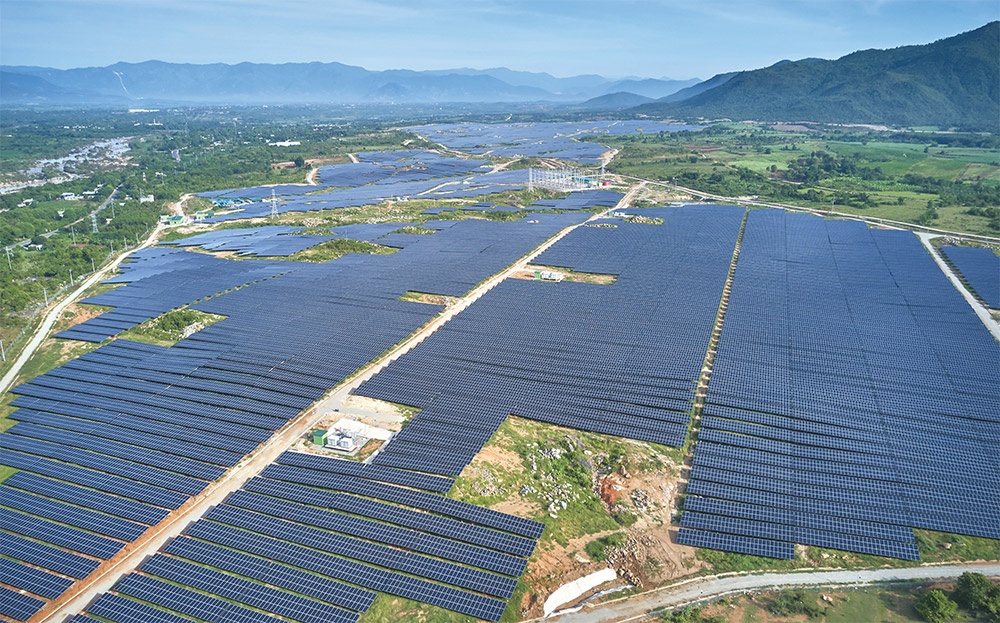The case for credit enhancement facilities to bridge infrastructure gap
Infrastructure development of Vietnam lags behind its regional peers despite decades of substantial investment. According to the World Bank, it is 47th globally for overall infrastructure quality.
 |
| Denesh Srishanker, group head of Credit Enhancement Facilities at the Private Infrastructure Development Group |
The Global Infrastructure Outlook estimates that Vietnam requires nearly $600 billion in infrastructure investment through 2040 to achieve its development aims. This includes developing sectors such as transportation, energy, water supply and sanitation, telecommunications, and digital infrastructure. In this period, Vietnam is projected to accumulate approximately $500 billion in investment, leaving a $100 billion shortfall.
To fill this gap, the country needs innovative financing solutions that can mobilise the long-term capital for sustainable infrastructure assets. In particular, local currency financing options are critical to ensure sustainable financing is available. Credit enhancement facilities (CEFs) – which issue local currency credit guarantees that improve the credit ratings of projects and developers approaching lenders for debt – can mobilise the private debt necessary for development.
While Vietnam has growing pools of capital from life and non-life insurers, there is limited mobilisation of this liquidity towards infrastructure financing.
In 2023, Vietnam’s commercial banks allocated only between 5-7 per cent of their loan books towards infrastructure projects. As of June of last year, the State Bank of Vietnam introduced medium- and long-term lending restrictions, limiting banks’ capacity to provide local-currency, long-term loans. In an environment where policy is tightening and banks are reducing exposure, the long-term lending that CEFs enable is increasingly critical.
The Private Infrastructure Development Group (PIDG) has seen significant demand from institutional VND investors to diversify portfolios and better match asset-liability profiles. A CEF can act as a bridge between such under-deployed VND funds and infrastructure projects, and firms that need long-term, local currency debt.
In doing so, a CEF can serve as a catalyst for a more developed and mature local currency capital market as a whole. By establishing CEFs, we are working towards a future where familiarity with long-term lending and consistent evidence of project success will make it easier for the private sector to play a bigger role in financing infrastructure.
This evolution will help establish a more developed and mature local currency debt market – and in turn, increase the resilience of the local financial system.
A Vietnam CEF: how it would work
In Vietnam, a CEF could be set up as a for-profit non-bank financial company. Guarantees would be issued for tenors of up to 20 years, supporting the development of long-term debt instruments. We expect that a Vietnam CEF would be locally rated AAA, benefitting from a strong credit profile.
Sponsors and borrowers obtaining local currency financing facilitated by a credit guarantee would reduce exposure to foreign exchange mismatch risk. A credit guarantee would also enable them to borrow a larger quantum of capital for a longer timeframe, thereby making debt servicing more feasible over the long term. For debt investors, the credit guarantee provided through a Vietnam CEF would offer reassurance of capital recovery, unhindered by changing regulatory conditions. The guarantee would also enable exploration of new sectors and asset classes in a lower-risk environment, providing an opportunity to better understand new avenues for investment.
In terms of the guarantee structure, a CEF could provide up to 100 per cent cover to debt instruments issued by private and public institutions in Vietnam. The guarantees offered through a CEF can be structured to provide comprehensive non-payment cover over scheduled repayments of principal and interest for each transaction. Issuers and borrowers pay CEF guarantee fees for offering the guarantee services.
In over 15 years of working in Vietnam, PIDG has contributed to the development of Vietnam’s markets by supporting Vietnamese infrastructure companies in raising long-term local currency debt and equity financing.
To date, it has committed $200 million to support 12 infrastructure projects in Vietnam. Across the globe, in the more than 20 years since our founding, we have invested more than $42 billion in over 230 projects, and mobilised $25.5 billion in private sector investment.
 |
A track record of success
A core focus of PIDG’s 2023-2030 strategy is on setting up local guarantee facilities in partnership with local stakeholders and investors to unlock domestic capital for infrastructure financing. Building on the experience of three facilities launched in Asia and Africa, we aim to set up several more facilities in the next 10 years.
In 2020, PIDG came together with Karandaaz Pakistan to launch InfraZamin Pakistan, the country’s first CEF, supporting domestic infrastructure financing. InfraZamin then completed its first transaction with Multinet, a Pakistan-based fibre optic and connectivity provider.
Backed by an InfraZamin partial-risk guarantee, Multinet was able to secure a loan facility from Pakistan’s Habib Bank, supporting the company’s drive to increase fibre optic penetration in tier 2/3 cities, and acquire more small- and medium-sized business customers. As part of the transaction, InfraZamin asked Multinet to establish new transparency reporting and governance standards, increasing its chances of securing future rounds of capital.
InfraZamin also supported the launch of Pakistan’s – and South Asia’s – first gender bond. The proceeds of the bond will help fund the lending of Kashf Foundation, a microfinance company that offers a suite of innovative financial products and services to low-income households in Pakistan, with a 100 per cent focus on women. The bond received an AAA rating in 2023 by the Pakistan Credit Rating Agency.
InfraCredit Nigeria, another PIDG CEF, is the first Nigeria-based credit guarantor focused on credit-enhancing infrastructure bonds for pension fund investors. As a founding investor, alongside the Nigerian Sovereign Investment Authority, PIDG supported InfraCredit with grant funding, equity investment, callable capital, and its expertise in both guarantees and infrastructure.
InfraCredit currently has 14 transactions in its portfolio, having mobilised $96.6 million from domestic pension funds and insurance companies.
PIDG’s latest credit enhancement facility, the Dhamana Guarantee Company, aims to catalyse domestic capital market development in East Africa, following its recent incorporation in Kenya.
As Vietnam sits at an exciting – and sometimes daunting – place in its development, we believe a CEF can play a key role in helping financial markets mature and delivering the infrastructure that is needed. This can be done in a way that is climate-aligned, with consideration for nature and the needs of communities.
In a feasibility study funded by PIDG in 2023, it was found that a local credit enhancement facility could mobilise a potential $20 billion capital financing over the long term in Vietnam by encouraging investment flow from insurance companies and the public pension fund, making significant headway in closing the investment gap.
It is this kind of progress that helps to fulfil our mission: to get infrastructure finance moving and multiplying – accelerating climate action and sustainable development where most urgently needed.
We invite partners to join us in releasing new streams of domestic finance through a Vietnamese credit enhancement facility, including the government, to help build regulations to support the setup of such commercial guarantee vehicles. Together, we can build market confidence and create pathways for sustainable growth.
What the stars mean:
★ Poor ★ ★ Promising ★★★ Good ★★★★ Very good ★★★★★ Exceptional
Related Contents
Latest News
More News
- Private capital funds as cornerstone of IFC plans (February 20, 2026 | 14:38)
- Priorities for building credibility and momentum within Vietnamese IFCs (February 20, 2026 | 14:29)
- How Hong Kong can bridge critical financial centre gaps (February 20, 2026 | 14:22)
- All global experiences useful for Vietnam’s international financial hub (February 20, 2026 | 14:16)
- Raised ties reaffirm strategic trust (February 20, 2026 | 14:06)
- Sustained growth can translate into income gains (February 19, 2026 | 18:55)
- The vision to maintain a stable monetary policy (February 19, 2026 | 08:50)
- Banking sector faces data governance hurdles in AI transition (February 19, 2026 | 08:00)
- AI leading to shift in banking roles (February 18, 2026 | 19:54)
- Digital banking enters season of transformation (February 16, 2026 | 09:00)

 Tag:
Tag:


















 Mobile Version
Mobile Version